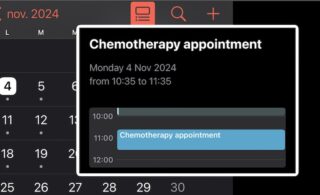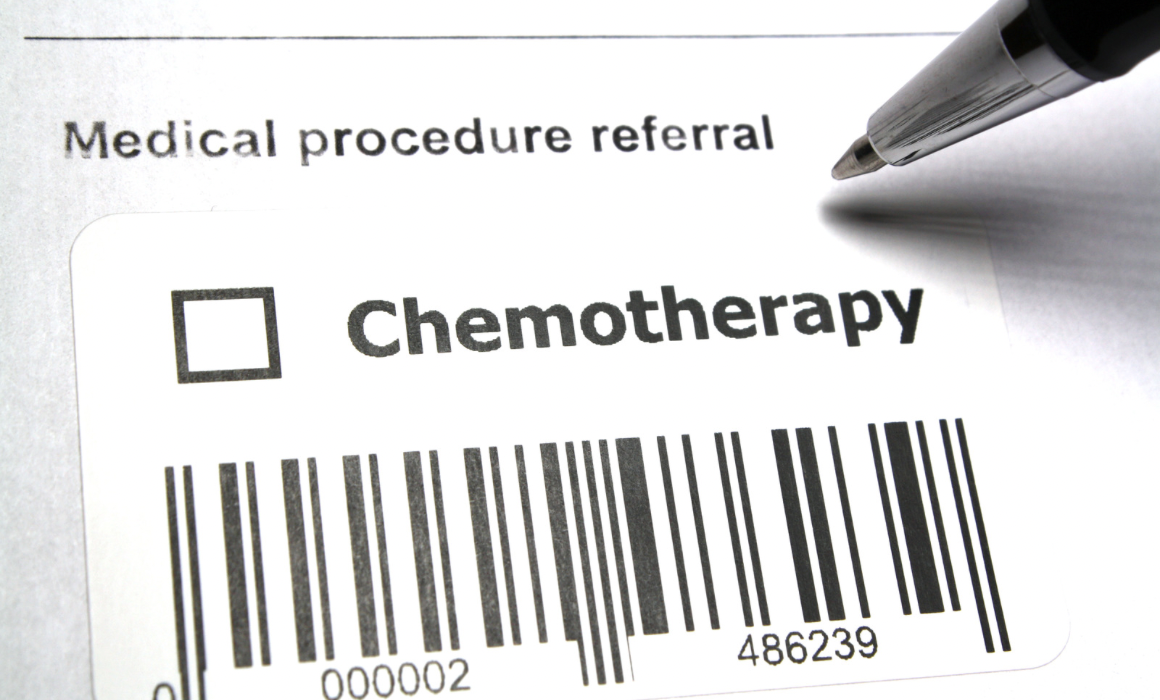
It is, quite frankly, terrifying to hear that you need chemotherapy (although not everyone who is diagnosed with breast cancer needs to have chemotherapy). But don’t panic. Most of the fear is fear of the unknown. So with a little bit of information, fore-warned is fore-armed.
A lot of hospitals invite you to have a tour of the ward before your first chemotherapy appointment so you can see the setting, meet the nurses and ask any questions. In the meantime, before you head off for your tour of the ward, here are our top twelve things to know about chemotherapy. We’ve written this article from our own experience as patients and we encourage you to speak to your medical team about your personal situation.
Chemotherapy, explained:
1. It’s just medicine. Chemotherapy is the name given to the medicine that you are given for cancer treatment. Chemotherapy drugs aim to destroy the breast cancer cells. (Unfortunately they can also destroy some of your good healthy cells which is what leads to the possible side effects such as hair loss and a lower immunity to infections).
2. The A to Z of chemo drugs. There are a number of different chemotherapy drugs that can be given for breast cancer. A helpful list of these (with information on possible side effects, how they are given and so on) is on the Breast Cancer Now website and another helpful resource is on Cancer Research UK. When you meet your oncologist to learn what your chemotherapy treatment plan will be, make sure you know the name of your chemo drugs if you want to then look up their side effects using these links. The oncologist and chemo nurses use a lot of abbreviated names for the chemo drugs and these can be confusing.
3. Let’s get personal. The chemotherapy that your oncologist prescribes for you is called your chemotherapy treatment plan (or regime). Your oncologist takes a lot of factors into account when he/she works out what is best for you. Your treatment plan may consist of just one type of drug, or a combination of two or more. And on your treatment plan you may have to have chemo once a week, or more or less frequently than that. Everyone’s chemotherapy plans are different and personal to them. And likewise, everyone experiences side effects differently. So don’t compare your chemo journey to anyone else’s.
4. Your chemo cycle (no it’s not a bike). You will have a number of “cycles” of chemotherapy during the course of your chemotherapy treatment. A “cycle” is the period of time between one round of treatment and the start of the next. There is usually a rest period between each round of treatment to allow your body to recover. The rest periods are different for each of the chemotherapy drugs. For example, Sara had:
4 cycles of a chemo drug called ‘EC’ where each cycle was:
- Day 1 treatment day (cycle 1 of EC)
- Days 2 – 28 rest days
- And then start again
- Day 1 treatment day (cycle 2 of EC)
- Days 2 – 28 rest days
- And repeated for 4 cycles.
And then 12 cycles of Taxol where each cycle was:
- Day 1 treatment (cycle 1 of Taxol)
- Days 2 – 7 rest days
- And then start again
- Day 1 (cycle 2 of Taxol)
- Days 2 – 7 rest days
- And then repeated for 12 cycles.
5. How will chemo be given to me? Chemotherapy drugs can be administered in different ways. For breast cancer it is usually given as a day patient in hospital intravenously (which means the drugs go straight into a vein). The drugs are diluted in liquid in a small bag and the bag is connected to a little pump which very slowly pumps the liquid into your body via one of your veins. To get the liquid directly to a vein, you will have a little tube fitted to a vein in one of these ways (it is generally up to your hospital which one you will have, and not be given a personal choice although it is always worth asking your oncologist about your options):
- A cannula tube into your hand or arm which is fitted each time you go for chemotherapy. The nurse inserts a needle into a vein your arm or hand and the needle is attached to the chemo IV by a tube. This is put in the arm where no lymph nodes have been taken out. If you have had lymph nodes out from both sides then this may not be an option and you will need to discuss it with your oncologist. More info is on the Cancer Research UK website.
- A PICC line into your arm which is fitted under a local anaesthetic before chemo starts and stays in your arm for the whole period of chemo treatment. Crudely put, this is a tube from a vein in your arm which can be accessed, outside your arm. This is put in the arm where no lymph nodes have been taken out. If you have had lymph nodes out from both sides then this may not be an option and you will need to discuss it with your oncologist. If you have a PICC line then you need to keep the part which enters you arm, clean and dry. This means getting prepared with PICC line covers for showering, daytime and nighttime. You can google PICC line covers and there are loads of online stores. You can easily make some yourself and Pinterest is full of ideas. More info is on the Cancer Research UK website.
- A port (or portocath) in your chest or upper inner arm which is fitted before chemo starts and stays in your chest/arm for the whole period of chemo treatment. It is a little button the size of a pound coin with a small narrow tube about 10 cm long. Under a local anaesthetic the button is placed in your chest just below the clavicle and the tube is attached to a vein your neck (or if it is fitted in your arm the tube goes to a vein your arm).
Once the small incision heals, you can’t see the port. For chemo, your nurse accesses the port (button) by inserting a needle through your skin into the port. The needle is attached by tubes to the chemo IV pumps. (Sara had a port and found that if she applied EMLA cream to the port area an hour before chemo and it worked brilliantly to numb the area when the needle was inserted into the port – ask your chemo nurse about this). More info is on the Cancer Research UK website. - A central line into your chest or neck which is fitted under a local anaesthetic before chemo starts and stays in your chest or neck for the whole period of chemo treatment. More info is on the Cancer Research UK website.
Most people cannot feel anything as the chemo drugs enter your veins and make their way around your body. There is no burning sensation or anything like that. Sara notes that the only thing that she occasionally felt was a cool feeling as the chemo drugs were pumped in. But it didn’t hurt.
6. Pre-meds and post-meds. You will be given some anti-sickness medicine, anti-histamines and steroids before and/or after chemo (these vary depending on which chemo drugs you are given, which hospital and how badly you feel sick). These help stop you feeling sick and prevent any allergic reactions. The anti-histamines can make you feel sleepy during and after chemo. If you are given any to take at home then it is really important to follow the instructions carefully. And remember not to take any steroids after around 2pm because you will be awake all night. Unfortunately some of the medication can also lead to weight gain. Macmillan has a lot of information about anti-sickness drugs.
7. How long will I be in hospital? You will probably go into hospital as a day patient for your chemotherapy. You will be given your pre-meds and then your chemo drugs. Depending on the IV access device you will probably have a few “flushes” through your IV line which is where a saline liquid is pumped through the IV tube after each drug. Sometimes the chemo nurses may want to keep an eye on you after you have finished having the drugs. This is to check that you don’t have any reactions to the drugs. So, you could end up being in hospital for anything from an hour to most of the day. Your chemo nurses can give you a good idea of timing when you go for the pre-chemo ward tour.
8. Cold cap. You can choose to wear a special hat called a cold cap, during your chemotherapy which can sometimes help to prevent hair loss. There is more information about this in our hairloss section.
9. Bloods. You will have a blood test before each chemo cycle to check that you are healthy enough to have the chemo (usually the day before chemo is due). This is because the chemo drugs can impact upon your good healthy cells like red and white blood cells. The blood tests check a whole host of things including: red blood cells (which are needed to carry oxygen around your body), platelets (which are needed to help form clots to prevent bleeding) and neutrophils (“neuts” – which are the white blood cells which fight infection). If your blood test shows that you have a low blood count then you may need to delay the next cycle of chemo until you are better (so you have a longer rest period before the next course of chemo is given). It is not uncommon for your neuts to fall over the course of your chemo treatment and for you to have to delay your next cycle.
10. A boost for immunity. Following each round of chemo, you may need to have an injection, or more than one injection, to boost your white blood cells (which helps increase your immunity). These are either done at hospital by a nurse, or by you at home. Some people just have one for every cycle, and other have one a day for a week. It depends on your chemo drugs and the hospital policy.
11. Side effects. You will probably have some side effects but everyone reacts differently to chemo. There is a section on side effects in which we talk about some ways to help them.
12. Ups and downs. It is perfectly normal to have emotional highs and lows during your chemo journey but you can help yourself in a number of ways – take a look at the section on life during treatment for some suggestions of how to get through treatment. You may also want to talk to a counsellor, clinical psychologist or others who have been through this experience.
Further information
The Breast Cancer Now booklet on chemotherapy can be downloaded or ordered here
If you want to see what chemotherapy is all about before you start, dispelling any myths you may have heard and making the scary unknown feel less unknown, then you might want to look at the video of Victoria Derbyshire (BBC journalist) having her first chemo session.
“Braving Chemo: What to Expect, How to Prepare and How to Get Through It” by Beverly A. Zavaleta MD (available from Amazon and other book stores). A practical and helpful guide to preparing for and going through chemotherapy.
Future Dreams hold a range of support groups, classes, workshops and events to help you and your carers during your breast cancer diagnosis. These are held both online and in person at the London-based Future Dreams House. To see what’s on offer and to book your place, see here.
To return to the homepage of our Information Hub, click here where you can access more helpful information, practical advice, personal stories and more.
Reviewed February 2023
The information and content provided on this page has been written from a patient’s perspective then reviewed by a breast care nurse and it is intended for information and educational purposes only. It is not intended to substitute for professional medical advice. Please contact your medical team for advice on anything covered in this article and/or in relation to your personal situation. The links and/or recommendations in this article to third-party resources are for your information and we take no responsibility for the content contained in those third-party resources. Any product recommendations made in this article are not product endorsements and unless otherwise stated, they are made without any affiliation to the brand of that product. We ask you to note that there may be other similar products available.
Share

Support awareness research
Donate to those touched by BREAST cancer
Sylvie and Danielle began Future Dreams with just £100 in 2008. They believed nobody should face breast cancer alone. Their legacy lives on in Future Dreams House. We couldn’t continue to fund support services for those touched by breast cancer, raise awareness of breast cancer and promote early diagnosis and advance research into secondary breast cancer without your help. Please consider partnering with us or making a donation.



